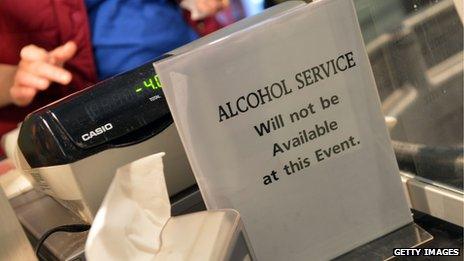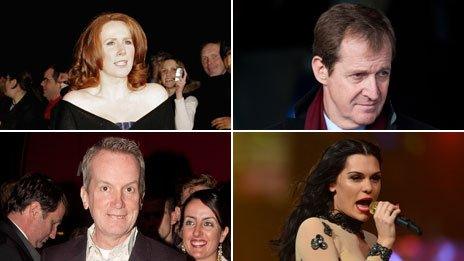Alcohol-free January: Where can you go to avoid people drinking?
- Published

Many people are attempting to stop drinking during January. But with drinking at the heart of British social life, it's not easy.
January is a time for sobriety. For some that means total abstinence.
It's the only time of year in the UK when a lot of people bond over not drinking. This year two charities have given their blessing to temporary teetotalism. Alcohol Concern has launched Dry January, external while Cancer Research UK is pushing its Dryathlon, external.
Those responding to campaigns like this can face a tricky month. Nobody wants to avoid socialising for a whole month, but with the British mania for social lubrication it's hard to avoid temptation.
Think of a social occasion and it is hard to find many that do not involve booze. Traditional rites of passage - christening, wedding, funeral - are a precursor to a glass of cava or, perhaps at a wake, a steadying whisky.
Occasions that seem to have no particular connection to drinking are still alcohol-laden occasions in British society. Sport's associated with health, but how many people gather for a game of five-a-side football and hit the bar immediately afterwards? Five-a-side centres typically have a bar to cater for this desire and Carling launched a 2% beer for the post-football drinkers.
Book club usually means drinking. Many base themselves in pubs and even a Sunday lunchtime meeting can still mean endless glasses of cheap white wine.
Fancy a trip to the theatre or to see some classical music? Be careful to avoid the interval drinks scrum. Hippos make their way to the watering hole with more restraint and poise.
Comedy? Drink-fuelled. Dinner party? Everybody's brought wine. Picnic? Ice bag for the beers. Inter-city train travel? Count the miniature bottles of wine.
Alcohol dominates the British idea of a first social meeting. In the US, romances might start with the line, "D'you want to go for a coffee?"
"D'you want to go for a drink?" is the classic British equivalent.
It's possible to turn a drink down, especially if you have religious dispensation. But for everyone else, eyebrows may be raised if one is not driving, pregnant, or on antibiotics.
"Britain is one of the hardest countries in the world not to drink," says Alastair Campbell, Tony Blair's director of communications at Downing Street, and a former alcoholic. "In America you don't really feel you have to explain yourself if you say 'I'll have a glass of water'."
Not drinking in January is chiefly about getting healthy after Christmas excess. But it may reveal deeper truths about the British character.
"We'd like to get people thinking about how very weird your social life is when you don't drink alcohol in this country," says Andrew Misell, spokesman for Alcohol Concern.
"Who's coming to the pub?" is the rallying cry at a thousand offices.

Famous abstainers (clockwise from top left): Catherine Tate, Alastair Campbell, Jessie J, Frank Skinner
There's a rounds culture once you get there. You are buying into the collective. Anyone abstaining is sending a message to the group. "If someone opts out from the group it's almost like a rejection," says social anthropologist Kate Fox, author of Watching the English. "Others will get drunk and silly and the one opting out will look on a bit pious and disapproving."
So what can the alcohol abstainer do without becoming a hermit? Lobby group Drink Aware suggests karaoke, external, but this seems to ignore the predilection for Dutch courage. Cinemas, which used to be dry, increasingly have bars. There is church, if you exclude the sacramental wine.
A rare exception to the booze-as-social-life mandate is the growth of the coffee shop. But aside from that, alcohol is everywhere.
The growth of wine sales in the UK - an "incredible marketing success story" - has softened the image of alcohol and widened its appeal, particularly among women, Campbell says.
"People say 'I'll just have a glass of wine'. It's almost like you're not drinking," he says.
Fox, a researcher into behaviour around alcohol, says many cultures use drink for socialising. But the British appear lost without it.
"They suffer from what I call social dis-ease. We don't have that natural street corner social ease that seems to come so naturally in other countries."
Misell wonders if alcohol has become a crutch for friendship. "You might wonder 'why do I need to drink to be with my friends? I should be able to relax with them anyway.'"
Then there's the idea that alcohol equals fun. The comedian Frank Skinner, who used to be a heavy drinker before giving up, described in a newspaper column, external how he would sit around with friends and laugh at their drunken exploits.
"None of us had the guts to say: "But it wasn't really us, was it? It was us made more colourful by a drug."
For Skinner it was a self-delusion that also afflicted the respectable social drinker for whom alcohol made life "that little bit more manageable, that little bit easier to navigate."
But Roger Protz, editor of the Good Beer Guide rejects the idea that the UK is a dependency culture reliant on drink. Alcohol consumption is falling, he says. An analysis of HMRC data, external shows that total alcohol consumption per head of the UK population fell by 13% between 2004 and 2011
And to give up alcohol completely smacks of the crash diet. "There's a lot of medical opinion in Germany about beer and health suggesting that in moderation it is likely to do you more good than harm." The key is to "sample it, sip it, savour it" with likeminded people, he says.
Some may be attracted to the idea of complete abstinence. It is a staple of religious orders to fast or adhere to a strict diet. It offers a sense that one is taking control of temptation.
But this is an "unhealthy" way to treat alcohol, Fox believes. As with many other Protestant countries, the UK has a tradition of seeing drinking as an exciting vice rather than something more everyday, such as a glass of wine with food. It is famine or feast.
"The idea of giving up drink for a month is not something people do in an integrated drinking culture. It's almost like a religious purging of sin."
You can follow the Magazine on Twitter, external and on Facebook, external